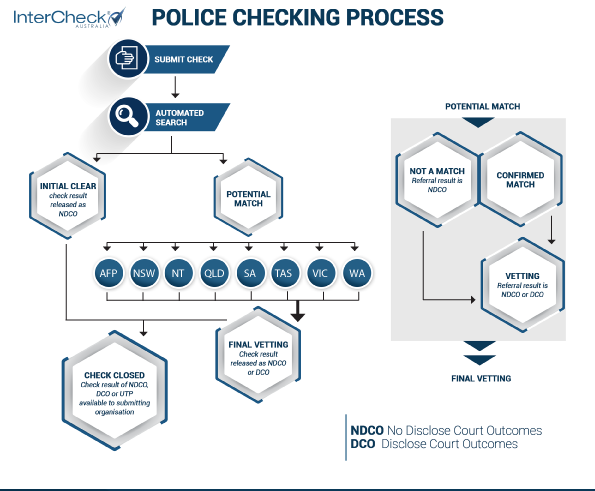There are a small number of checks may take longer to process and thus, will be flagged for manual review.
This means your application will be manually reviewed by the police for further investigation. There are many reasons as to why this may occur. These reasons may include:
- You having a common name, or a Given and/or Surname that has a potential match with other potential persons in the National Police Checking Database.
- You having old Police History Information that requires manual collection and processing of hard copy records,
- The relevant police agency having inaccurate or incomplete records which need to be investigated properly before the check can be finalised,
- Transferring information between the various state and territory police agencies before the information can be vetted/verified and/or released, and
- Workloads and resources within each police agency.
There are 10 steps in the police checking process, no matter which agencies organisation you lodge your application through:
Step 5: Request for Further Information (RFI)
Step 1: Submit Check
A check is submitted by an Accredited Organisation or police agency into the NPCS Support System.
It is vital to the accuracy and validity of the check that the information submitted per the Application/Informed Consent form is correct.
Step 2: Automated Search
Once the check is submitted, using a matching algorithm, the Applicant’s name(s), sex and date of birth are used to conduct an initial search of a central index for potential matches against Persons of Interest (POI) who are known to police.
Step 3: Initial Clear
When no potential matches against the applicant’s name(s), sex and date of birth are generated from the automated search, an instant result or initial clear will be returned to the Accredited Organisation.
The result of ‘No Disclosable Court Outcomes’ (NDCO) is then released to the submitting organisation
Step 4: Potential Match
When the automated search of the applicant’s details finds potential matches against POIs, the matching information is referred to the relevant police agency where the information is held about that POI.
The police agency will then draw on relevant police information to determine whether the applicant is the same person as the POI—this is known as ‘matching’.
Step 5: Request for Further Information (RFI)
In some instances, the police agency may need additional information to assist in making a matching decision.
The RFI will generally take the form of additional personal details, such as previous addresses, photo ID or requesting an Applicant attend a police station to submit a fingerprint sample.
Step 6: Not a Match
Matching by the police agency determines that the Applicant is not a match with the POI.
Step 7: Confirmed Match
Matching by the police agency determines that the Applicant is a match with the POI. The check now moves into the vetting stage.
Step 8: Vetting
Once a match has been confirmed, the police agency that holds the information about the POI undertakes vetting of the relevant PHI held on its systems. Vetting involves applying relevant legislation and/or information release policy to the PHI, to determine what can be released. The police agency also takes into account the category and purpose of the check to determine the type and amount of information that is released. The check then goes into the Final Vetting stage.
Step 9: Final Vetting
The police agency in the state or territory that the Accredited Organisation has its registered business is responsible for reviewing the vetted results from each referral and apply its own legislation/ policy to determine what PHI will be released to the Accredited Organisation.
Step 10: Check Closed
The results of the check will be released to the submitting organisation.
The result will either be:
• No Disclosable Court Outcomes (NDCO) – there is no PHI that is held or that can be released to the submitting organisation.
• Disclosable Court Outcomes (DCO) – PHI exists that can be released to the submitting organisation. The PHI may include:
- charges
- court convictions, including any penalty or sentence
- findings of guilt with no conviction
- court appearances
- good behaviour bonds or other court orders
- pending matters awaiting court hearing.
- traffic history








